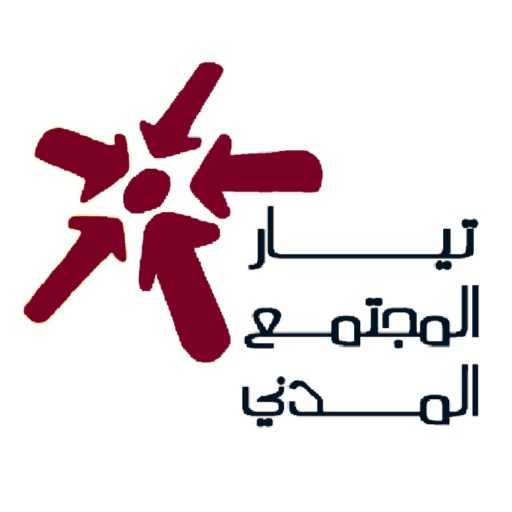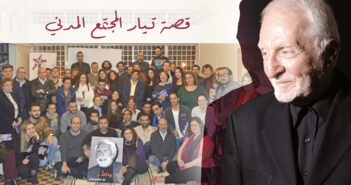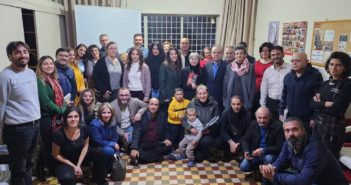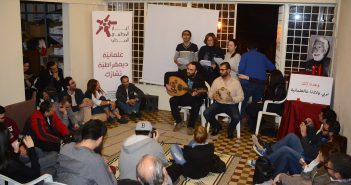The Human Computer
Date: 2001, 2002, 2003
Place: All the Lebanese provinces
Topic: Statistical Work
The Civil Society Movement launched the Human Computer project in the year 2001. The project aimed at gathering young volunteers from all areas to make use of their living in different areas to collect health, social and development information that would help in preparing and executing development projects in the areas where they lived. This project was supervised by Dr Shbeib Diab.
Developing Districts Councils
Date: 2001 and 2002
Subject: Reactivating health and education councils of the Lebanese districts
The Civil Society Movement has launched this project in all the Lebanese districts and it aimed to reactivate health and educational councils. Several meetings were held with governors, representatives of municipalities and other authorities to inquire about the necessities various districts. These necessities were met via proper official authorities and education councils.
The Publication of “Tawasol”
“Tawasol”, meaning communication, is a news bulletin that was released by the Civil Society Movement in the year 2002. It aimed at enhancing the Lebanese youth political, social, cultural and environmental awareness in order to bring positive changes to society. It published the Civil Society Movement’s activities and projects as well as its members’ and friends’ opinions and other various articles.
Cleaning the public gardens of Beirut
Time: 2002
Place: Beirut public gardens
Subject: cleaning the public gardens and providing children with security
The CSM launched in 2002 a project to organize the public garden of Beirut. The project started by cleaning the public gardens and then providing and training volunteers to take care of children there.
Cleaning the Lebanese Beaches Campaign
Time: August 3 and 4, 2002
Place: the Lebanese beaches
Subject: Cleaning the Lebanese beaches
With the support of Mrs. Andre Lahoud, the Civil Society Movement organized a campaign to clean the Lebanese beaches on August 3 and 4, 2004.
The campaign was organized with the help of the Lebanese Red Cross, Civil Defense, the Lebanese Army, CEDARS Foundation, and the Lebanese Assembly for the Protection of the Environment, Fouad Makhzoume Foundation and municipalities. A coordination committee was formed by all participants to help organize the work done by volunteers. The first day began with the preparations made to remove garbage with the help of vehicles and then the work was resumed the following Sunday with the volunteers.
The campaign included the following beaches:
Anfe, Araman, Tripoli and Abde in North Lebanon
Sidon, Sarafand and Tyr in South Lebanon
Amchit in Lebanon Mountain District
The Lebanese Students Club
Time: 2003 and 2004
Place: Beirut and Mountain Lebanon District
Subject: in the academic years 2003 and 2004, the Civil Society Movement made a project that included the students of various schools in Beirut and Mountain Lebanon District. The project aimed at helping students and schools work together on making various activities. Each school used to offer a hall for the appointed activity. The Students’ Club was an attempt to introduce students from different social and cultural backgrounds to enhance their citizenship.
The schools that took part in the project were: Al Rawda High School, Aljomhour, Alkawthar, Al Makassed, Al Ahlieh and Annahda.
Several meetings were held in Civil Society Movement for representatives of the teachers and students to discuss the suggested activities. These activities included fieldtrips, gatherings, dinners and sports days.
No to War and Racism, Yes for a secular Democratic Society
Time: May 27, 2004 at 6 pm
Place: the National Museum stairs
Attendees: more than 70 persons
Subject: A meeting against sectarianism and racism and a musical concert
With the support of the Civil Society Movement, the Leftist Assembly for Change and the Democratic Lebanese Youth Union, a meeting for the youth was held at the stairs of the national Museum against sectarianism, racism and war and in support of a secular democratic society.
This event included a musical concert with the participation of many bands that had the themes of sectarianism and racism in their music. The event ended at 10 pm.
The Secular Organizations Meeting
Time: 2004, 2005
Place: the Civil Society Movement Center- Badaro
Subject: A regular meeting for secular organizations
The Civil Society Movement hosted in 2005 more than 40 secular Lebanese organization in preparation for the Secularist Conference in Lebanon. These organizations agreed to hold regular meetings to discuss the latest national issues and to work together on secular activities. This meeting ended with a founding statement and it continued to take place regularly until the Conference for the Lebanese Secularists was held in 2006.
The Conference for the Lebanese Secularists
Time: Friday 5 and Saturday 6, May, 2006
Place: the UNESCO Palace, Beirut, the Grand Hall
Attendees: More than 500 persons
Subject: the Secularists Conference
Lecturers: Bishop Gregoire Haddad, Dr. Atef Attieh, Dr. Ahmad baalbaky, Dr. Ibrahim Traboulsi, Dr. Fehmiyye Sharafeddine, Dr. Issam Sleiman, Dr. Nawaf Kabbara, Dr. Michael Abdulmassih, Dr. Kheirieh Kdouh, Dr. Gerome Chahine, Mr. Tanios Daibes
A number of people who believe in secularism called for a public conference that discusses secularism. The conference activities were to be accessible to the public. The planning for the conference and the registration to take part were on the following website: www.aalmana.org. The aim of the conference was to bring the greatest number of people who believe in secularism to meet and take part in activities calling for a secular and democratic society.
The Conference’s Schedule:
Friday, May 5, 2006: 3:30-4:00 pm: Attendee registration, the opening session, a description of a civil society and a general discussion and lectures by Dr. Atef Atieh and Dr. Ahmad Baalbacky
Saturday, May 6, 2006: the first session
1- Lectures on civil laws by Dr. Ibrahim Traboulsi and Dr. Fehmiyye Sharafeddine
2- Secular Election Law by Dr. Nawaf Kabbara and Dr. Issam Suleiman
3-The first session decisions and a discussion followed by lunch
The second session
1- Secular Education: lectures by Dr. Gerome Chahine and Mr. Tanios Daibes
2-the second session decisions and a discussion followed by a break
III_ the final drafting of the decisions and a reading of the final recommendations
4- the ending ceremony and a display of the movie “ the Sheikh Ali Shop “directed by Ayman Zougheib, followed by a discussion and a concert by Sami Hawat and the Rahala Band.
The Recommendations made by the Secularists Conference, May 2006:
The Conference stressed its discussing the term “secularism” to avoid its being associated with atheism and heresy on one side, and to show that it doesn’t oppose religious faith as it is a general view of the world (society, humans and thought). It stresses the independence of the whole world with all its aspects, values, bearings and behavior towards religious and nonreligious sects and various philosophies. It is a view which demands not only beliefs, but actual practice. Here lies the importance of fighting for and working on the causes called for by secularism: secular elections, education and secularism, media and secularism, all leading to a society of justice, equality peace and democracy and consequently a state with unified legal base of equality, liberty and following the Universal Declaration of Human Rights.
However, all this can’t be achieved without a pushing force from secularists in Lebanon to reach a common view to define the steps to be taken in order to reach a
Productive and successful agenda as happened in the Secularists Conference in 2005.
The first conference had recommendations on four levels: Personal Status, the Elections Law, Education and Secularism and Media and Secularism. A group of recommendations was made in the closing session and general secretary as well as four committees was made to work on the four stated four levels.
A Sit-in in Support of the Palestinian People
Time: 12, 13, 14 July, 2006
Place: Marty’s Square, Beirut
Attendees: More than 100 persons
Subject: A sit-in supporting the Palestinian people
The Israeli attacks on the innocent civilian Palestinian people tremendously escalated in July 2006 after capturing an Israeli soldier in Gaza. The attacks escalated to bombing, assassination, destruction and deliberate killing of Palestinian citizens.
The Civil Society Movement as well as other movements called for a sit-in in Martyrs’ Square in Beirut as a protest against the Israeli terrorist attacks against the Palestinian people and the inactivity of international human rights organizations.
The movements that took part in the sit-in were the Union for the Lebanese Democratic Youth, the Leftist Assembly for Change, the Communist Party and several other Palestinian youth organizations.
The sit-in included building tents where youth taking part in the sit-in gathered. It also included delivering a speech by the organizers and a photo gallery about Palestine as well as musical concerts. The sit-in continued day and night from Wednesday to Friday July 14 when it became a relief center as the Israeli attack on Lebanon began.
Relief and Aid during the War in 2006
Time: July 15 to August 14, 2006
Place: Beirut, Dahye and Aramoun
Subject: Aid and relief work during the 2006 war
With the beginning of the 2006 war, CSM turned into an operation room to help citizens and it worked together with several Lebanese and non Lebanese organization to provide people with their necessities like food, clothes and other things. It also worked on distributing aids on displaced families in many areas. The number of people who benefitted from CSM help was around 750 persons.
“Not to Suffer Again”, an activity in the memory of the Lebanese civil war
Time: 2, 13, 14 April, 2007
Place: Ain el Mreisse Corniche, CSM Badaro and several other places
Subject: In the memory of the beginning of the Lebanese civil war + launching the People’s Court
The CSM activity on Civil War
Time: 12, 13, 14 April, 2007
Place: Ain el Mreisse Boulevard, CSM Badaro and other places
Number of participants: 55 persons in CSM Badaro and over a hundred persons on the Ain el Mreisseh Boulevard
Subject: the beginning of the Civil War and the launching of the People’s Court
The CSM organized a group of activities remembering the civil war which out broke on April 13, 1975. The CSM worked on organizing this event with the Lebanese Disabled Union, the Lebanese Democratic Youth Union, the Socialist Council, the leftist Gathering for Change, the Khiam center for rehabilitation of the Victims of Torture and Nahnoo organization.
The activity was called “to remember so as not to repeat” and it included several meetings and the launching of the People’s Court. The meetings were as follow:
1. Thursday, April 12, 2007: the Lebanese democratic Youth Union organized a lecture on the causes and effects of sectarian political systems.
2. Friday, April 13, 2007: the Leftist Gathering for Change organized a lecture on the economic and social causes of the war.
3. Friday, April 13, 2007: the CSM showed “Hanging Dreams”, a movie on the war Mr. Jean Chamoun.
4. Saturday, April l14, 2007: the Lebanese Disabled union organized a lecture on the continuous suffering of the victims of war.
5. Friday, April 15, 2007: the Lebanese Disabled Union distributed flyers on war all over Beirut.
6. Friday, April 15, 2007: the leftist Gathering for Change organized a lecture “the Memory of War”.
The activity ended with the people’s Court and testimonies about the war made by many people who suffered because of the war.
July Recollects
Time: 16 and 17 July, 2007
Place: UNESCO Palace
Number of attendees: over 100 persons
Subject: a photo gallery about July 2006 war and a meeting with organizations that took part in the relief work in July and August 2006
In the memory of the 2006 war, the CSM organized in the UNESCO Palace a photo gallery by photographer Asaad Ahmad. The opening ceremony included speeches by CSM, Ahmad Asaad and MP Pierre Dakkash.
On july17, many organizations that took part in the relief work talked about their experiences during the war.
A trip to the South (Shkeif Fortress and Litani)
Time: Sunday, September 7, 2007
Place: Shkeif Fortress and the Litany River
Number of participants: 24
Subject: field trip
The CSM organized a field trip to the Shkeif fortress followed by lunch.
Poetry and Music Night
Time” march 29, 2009
Place: CSM, Badaro
Number of attendees: 49 persons
Subject: a poetry and music night
The CSM organized a poetry and music night in which many talented youth took part. The event started at7:30 and ended at 10 pm.
The artists Mona Hallab and Sleiman Zeidan also took part in the event. The event also included an acting sketch.
A Rally in Remembrance of April 13
Time: Sunday, April 13, 2008
Place: Beirut Streets
Number of participants: 100 persons
Subject: a rally and activity in remembrance of the civil war
In remembrance of April 13, 1975, the CSM, in collaboration with the Lebanese Democratic Youth Union, organized a rally that went through areas of religious identities.
The rally included a mimic activity resembling the religious situation that the Lebanese has been living. At the front of the rally walked six persons wearing coffins resembling Lebanese citizens who died during the war. They wrote on their chests the dates and causes of their death. Many people in black walked behind them resembling the parents of the victims of war. Behind them walked two persons resembling politicians. They held a rope that was caught by a group of people behind them representing their supporters. The idea was that supporters of politicians should be aware of the fact they themselves may be the victims of civil wars in the future.
This rally sang slogans against war and distributed flyers warning people about the danger of civil strife and religious political systems and calling for secularism.
The rally ended at six pm with the mimic activity ending by the people kicking the politicians away. At the end of the event, a speech was made by CSM stressing the need for a secular and civil state.
The objective of the activity was to overcome religious obstacles and prejudice. It also aimed at showing the Lebanese people that sectarianism leads to war and the salvation lies in secular laws.
A meeting to remove “Sect” from IDs
Place: CSM, Badaro
Time: 16/5/2009
Attendees: 35 persons
The CSM organized a campaign to remove the sect indicator from personal IDs and official documents. It asked an official employee to sign the application at the CSM center in Badaro and sent the applications of 30 persons who applied to related authorities by libanpost.
Amchit educative and entertaining summer camps since 2008
The secularist meeting
Place: CSM, Badaro
Time: the end of May 2010
Participants: interested people and various organizations
After the secularist rally which was organized in April, 2010, a group of secularist organizations and individuals called for regular meeting. The meetings started in May, 2010 with Bishop Gregoire Haddad and continued in regular meetings held at CSM, Badaro.
The Civil Society Movement, the Democratic Lebanese Youth Union, the Democratic Secular Gathering in Lebanon, Madaniyyon, the Socialis Forum, the Sarafand Star Educational and Sports Club as well as many interested people.
The Sarafandd star Educational and Sports Club, the Orient Club for Civilizations’ Dialogue, the Youth Movement, and many interested persons.
Tyr educational and Entertaining Camps starting from 2007
The CSM organized educational and entertaining camps in Tyr that brought together members and friends of CSM. These camps included musical concerts and beach camping.
Participating in the organizational committee for the civil campaign for electoral reform
The CSM was chosen to participate for three years in the organizational committee for the civil campaign for electoral reform. The CSM was represented in this committee by Lina Houssainy and Bassel Abdalla.
The ” Civil Marriage Tent” activity in 2010, 2011 in Ain el Mreisse, Hamra and Zahle
In the light of the CSM campaign aiming to enact an optional civil marriage law, the activities committee in CSM organized various activities under the title of “the Civil Marriage Tent aiming at enlightening the people about civil marriage and the importance of having it in Lebanon.
Devising the Optional Civil Marriage Law
The law committee in CSM devised in 2010 and law for optional civil marriage in Lebanon and finished it in 11/1/2011. It included the reasons to have it and the principles it is based on. the lawyers Bassel Abdalla, Lina el Houssainy and Rabih Hammoude as well as Dr. Ghada abou Moourad took part in devising the law. It was published in a booklet that was printed in 3/2/ 2011.
The five main rallies were:
I_ 27/2/2011 rally from St Michael intersection to Adlieh with 3000 participants.
II_ 6/3/2011 rally from Dawra bridge in Beirut to the Ministry of Electricity- Gemmayze with 9000 participants.
III_ 20/3/2011 rally from Sassine square in Achrafieh to Ministry of Interior in Sanayeh with 20000 participants.
IV_ 10/4/2011 rally from the National Museum to the Parliament with 5000 participants.
V_ 26/6/2011 rally from the Social Security Building in Mseitbe to the Parliament with 700 participants.
Breaking the sectarian political system
Following the revolutions in the Arab world, the CSM in collaboration with Secular Meeting on faceboook- for breaking the Sectarian Political System group- called for a meeting held in CSM center in Badaro on Tuesday February 22, 2011. This meeting was attended by more than 130 persons who agreed on initiating a movement against sectarian political system called “descending the sectarian Political System Movement” and they called for the first rally on February 22, 2011.
This movement was joined by a group of nonsectarian and secular youth as well as some people who had certain political affiliations but they joined the movement on their independently.
The movement called for a civil and secular state in Lebanon where all citizens have equal rights.
The movement formed several committees like the Committee of Planning, the Committee of lawyers, the Committee of University Youth; the Committee of Studies… the main committees had their meeting in CSM center in Badaro.
This movement included organizing many rallies and building tents in several areas like Aley, Baalbeck, Tyr, Byblos, Tripoli, it also included a meeting attended by 500 persons in UNESCO Palace on 6/3/2011. It also organized a sit-in on 19/5/2011 to enact a law to decrease fuel prices.
A statement showing the principles of the participants in the movement named ” An Announcement of Principles” was declared on April 29, 2011. The participants stated that most of the problems that the Lebanese suffer from are due to the religious political system as well as the dominating politicians with their external references. they also highlighted the fact that this political system prevents political and social reform because of its religious basis. As a result, the participants called for a new law based on the following:
- A secular and civil state where religions are separate from public institutions. A state that rules in the name of the people who are directly related to it legally, educationally, politically,…a state the ensures the freedom of religion, educational and ethnic and prevents religious strive.
- A state of human rights and equality that abides by the Universal Declaration of Human Rights.
- A state of social justice that aims at overcoming poverty, unemployment and economic and social abuse.
- A free and independent state that calls for the liberation of its land and prevents external interference.
- A state of law and public institutions that separates authorities and where the judicial system is free from corruption and bribery.
A lecture in AUB by Bishop Gregoire Haddad and a stand for CSM
Place: AUB, Beirut
Time: April 27 and 28, 2011
Organizers: AUB & CSM
Attendees: 60 persons
Lecturer: Bishop Gregoire Haddad
The AUB and CSM organized a gathering to honor Bishop Gregoire Haddad which included a lecture by him. The CSM had a stand in AUB for two days to help people learn more about its values.
Meetings and discussions on secularism, citizenship, religion, the constitution and several other educational and social issues.
Playing documentary, educational and famous movies in Hamra and CSM center in Badaro
“Skills and Tips 2011-2012” which is a series of training sessions.
Workshops:
A workshop on secularism on 11 and 12/8/2001
A workshop on secularism in Lebanon on 5 and 6/4/ 2002
A workshop on democracy on 5/5/2002
A workshop on democracy on 29 and 30/6/2002
A workshop on cooperation on 15/8/2002
A workshop on non-violence 5 and 6/10/2002
A workshop on development on 14 and 15/12/2002
A workshop on globalization on 26 and 27/4/2003
A workshop on social activation on 8/8/2003
A workshop on CSM future vision on 23 and 24/2004
A workshop on Secularism 1 on 30 and 31/7/2005
A workshop on secularism 2 on 27 and 28/ 7/ 2005
A workshop on secularism on 24 and 25/ 9/2005
A workshop on Electoral and Personal status laws on 29 and 30/10/ 2005
A workshop on the Secularists’ Cell in universities
A workshop on CSM political form on 1/5/2009
A workshop on Civil Personal Status Law on 4 and 5/7/2009
A workshop on Electoral law on 10and 11/10/2009
A workshop on citizenship in the Lebanese society on 19/11/2009
A workshop “Towards a Civil Personal Status Law” on 3 and 4/7/2010
A workshop on retirement and social security on 10/7/2010
A workshop on non-violence as a changing power on 2 and 3/10/2010
A workshop on a strategic plan to have civil personal status laws in Lebanon on 4 and 5/12/2010
An educational workshop on practicing democracy in schools on 11/12/2010
A workshop on citizenship in a society on many religions on 9/4/2011
A workshop on strategic planning to have civil marriage in Lebanon on 3 and 4/12/2012
A workshop on the “Retirement and Social Security Plan on 17/12/2011




